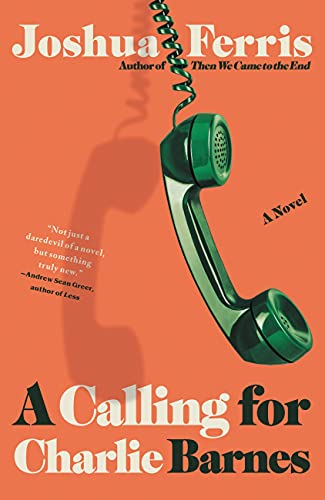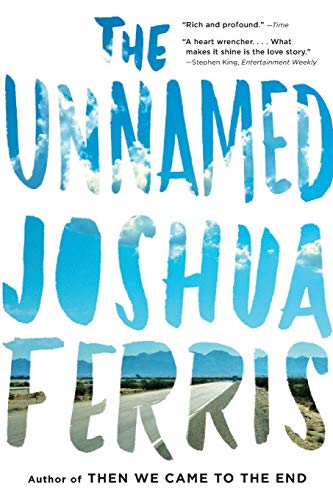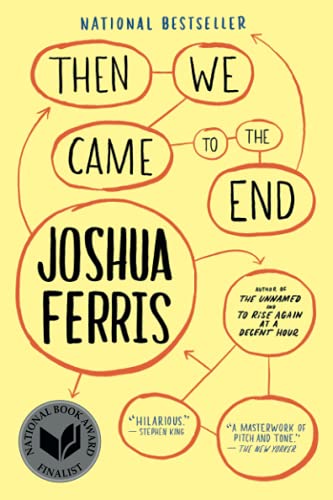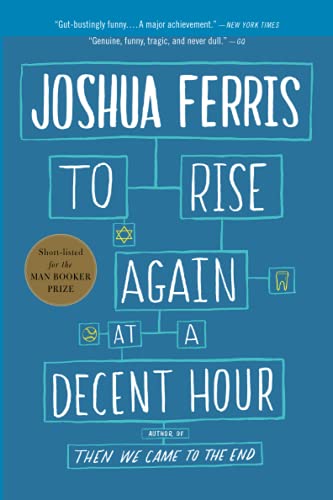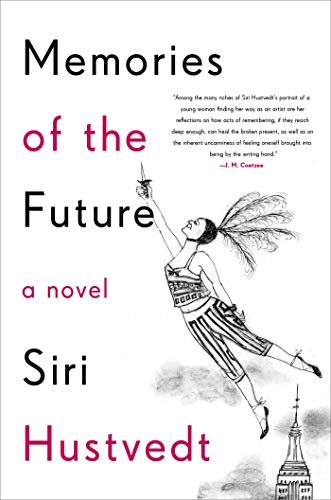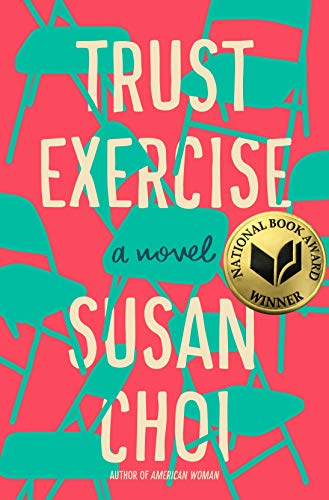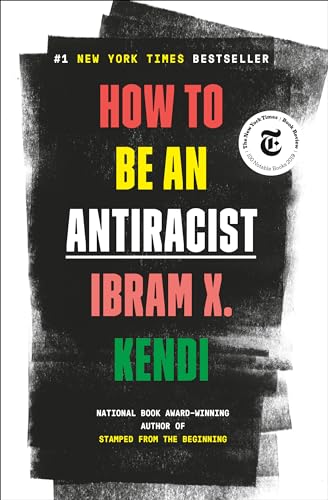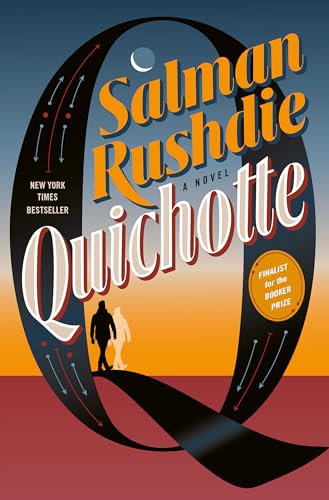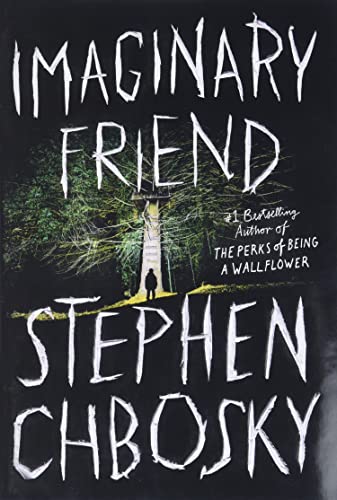This was always going to be about Joshua Ferris’s dad. “You catch me pretty fresh,” the author deadpans over Zoom. “I haven’t talked about it.” The “it” refers to his long-awaited new novel, A Calling for Charlie Barnes, which publishes in September. And to talk about it, he discovers over the course of this conversation, is indistinguishable from talking about his grief after the loss of his father, who died in 2014. It’s an experience that led Ferris down a long, winding road toward a book that he calls “a culmination of all of the other books that I’ve written.”
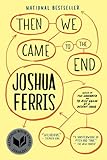
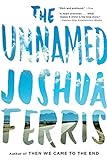
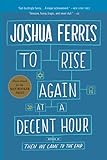 Quite a statement for the 46-year-old literary star. Ferris hadn’t hit 35 before his 2007 debut, Then We Came to the End, received a National Book Award nomination. His celebrated 2010 sophomore novel, The Unnamed, was followed by 2014’s To Rise Again at a Decent Hour, which was a Booker Prize finalist. Days after the latter was published, Ferris got to work on his next novel—sort of.
Quite a statement for the 46-year-old literary star. Ferris hadn’t hit 35 before his 2007 debut, Then We Came to the End, received a National Book Award nomination. His celebrated 2010 sophomore novel, The Unnamed, was followed by 2014’s To Rise Again at a Decent Hour, which was a Booker Prize finalist. Days after the latter was published, Ferris got to work on his next novel—sort of.
Coming off To Rise, Ferris felt challenged by his father’s perception of his calling. “He didn’t see the worth of fiction,” Ferris says. “To arrive at the answer for why that’s a facile perspective is very, very difficult.”
So Ferris began putting stories of his family, including his uncle and grandmother and cousin, to the page. “Very often I had nothing,” he admits. “That was so mystifying to me—all this life that these people generated, all of the wit and the confusion and the drama…It didn’t make for a good scene. It didn’t make for a good line. It didn’t make for a good story.” Pushing up against his late father’s perceptions, Ferris sought to “figure out what the relationship was between real life and the written word.”
The resulting book feels like both a radical departure from and a natural evolution of Ferris’s work. It’s “his version of a memoir,” says Judy Clain, Ferris’s editor at Little, Brown.
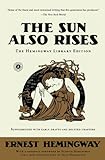 The story is narrated by Jake Barnes (a nod to the central character in The Sun Also Rises, and one of many overt literary references in the book). It opens in late 2008, when Jake’s father, Charlie, is diagnosed with pancreatic cancer while reeling from catastrophic financial losses due to the plummeting stock market. But life for the oft-divorced, ever-discontented man improbably goes on, and he’s granted a second chance. His son—so we’re told—is prepared to tell his story.
The story is narrated by Jake Barnes (a nod to the central character in The Sun Also Rises, and one of many overt literary references in the book). It opens in late 2008, when Jake’s father, Charlie, is diagnosed with pancreatic cancer while reeling from catastrophic financial losses due to the plummeting stock market. But life for the oft-divorced, ever-discontented man improbably goes on, and he’s granted a second chance. His son—so we’re told—is prepared to tell his story.
“Ironically, it follows my father’s actual biography,” Ferris says. “When he was diagnosed with a pretty damning cancer, he should have been dead within six months, but in fact he lived almost eight years. During that time, he had an opportunity to reflect upon the ways that he was and the ways he wished to be, and to bring them into closer alignment. I got an education in second chances.”
By digging into the relationship between his father’s life and the art of writing fiction, Ferris keyed into the truth behind it. “We are sustained by certain illusions until the day we die,” he says. “Those fictions are dearly held and deeply felt, and without them life would not be worth living.”
As A Calling for Charlie Barnes progresses, the eponymous hero’s mystery becomes increasingly entwined with the narrator’s image of it. “If this history of Charlie Barnes has its breaks in chronology and the occasional gaping hole…well, I wouldn’t know how to write it any other way,” one passage reads. “I couldn’t possibly hope to highlight what the man himself would have highlighted or, for that matter, present the arguments he might have presented against what I have chosen to highlight.”
The narration reflects the way Ferris talks about his book. “The leap into my father’s perspective and the conflicts that he carried around with him—I didn’t really want to do that,” he says. “Upon doing it, I recognized how difficult it is to do that in a fundamental way, even with somebody you’re incredibly close to. The emotional work that it takes to get into somebody else’s perspective is extraordinary.”
Clain zeroed in on this “autofiction aspect” and came away with a changed notion of it. “I learned that the truth in fiction doesn’t exist,” she says. “Just the truth of fiction.”
Ferris fans can rest assured that biting, laugh-out-loud humor—one of his signature strengths—returns in full force here. As ever, it’s tied up in the foibles of modern existence, from generational and political divides to the corrupt systems under which we all rather dutifully operate.
“In any kind of pattern of life, you see these ironies that rise above your own understanding,” Ferris says. “It is my preferred mode to always try to guess in my own life what those ironies are, so I don’t feel like a dupe. There’s nobody who feels more confused and benighted than me. But I’m at least out there doing my best to think, Where’s the pothole? Where’s the banana peel?”
If this is not quite Ferris’s silliest work, it feels like his most personal. But it doesn’t shy away from the political. It’s easy to see that the book was written during the Trump era. Nonetheless, the author makes clear that the novel is “not a political statement”—as it connects individual and collective experiences.
“One of the things that was continually put forth was, ‘Trump is tearing at the fabric of our dearly held illusions, he is tearing apart the fictions we’ve maintained about being a diverse, inviting country,’ ” Ferris explains. “This was very similar to the ways in which we hold on dearly to our own private notions that other people would more than happily destroy. I saw parallels all the time.”
Which brings us back, one last time, to Ferris’s father. The power of A Calling for Charlie Barnes rests exactly in those parallels, between its patriarch’s journey and the national undoing happening subtly around him.
Ferris’s work cuts to the heart of who we are by focusing very painfully on who one man was. “I am both trying to capture some of the psychological underpinnings that created a man like my father, and show the ways in which he used his brain and his heart to become not only a better father and a better man but a better American,” Ferris says. Consider this book not just a work of grief or love or memoir, then, but a work of hope, too.
Bonus Links:
—A Surreal and Outrageous World: Jessica Anthony in Conversation with Joshua Ferris
—Human Resources: On Joshua Ferris
—A Year in Reading 2009: Joshua Ferris
—A Year in Reading 2007: Joshua Ferris
This piece was produced in partnership with Publishers Weekly.
